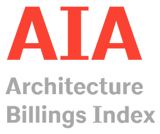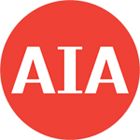AIA's Billings Index Numbers Rise In May
 Washington, DC –
Demand for design services in May saw few signs of rebounding following a record drop in billings the month prior, according to a new report from The American Institute of Architects (AIA).
Washington, DC –
Demand for design services in May saw few signs of rebounding following a record drop in billings the month prior, according to a new report from The American Institute of Architects (AIA).
AIA’s Architecture Billings Index (ABI) score for May was 32.0 compared to 29.5 in April, but still represents a significant decrease in services provided by U.S. architecture firms (any number below 50 indicates a decrease in billings). In May,
the decline in new project inquiries and design contract scores moderated from April, posting scores of 38.0 and 33.1 respectively.
“A large portion of the design and construction industry remains mired in steep cutbacks as many businesses and organizations are still trying to figure out what actions make sense in this uncertain economic environment,” said AIA Chief
Economist Kermit Baker, Hon. AIA, PhD. “There are growing signs of activity beginning to pick up in some areas, but others are seeing a pause as pandemic concerns continue to grow.”
Key ABI
figures for May include:
• Regional averages: West (36.0); South (30.6); Midwest (29.7); Northeast (25.1)
• Sector index breakdown: institutional (35.7); multi-family residential (34.8); mixed practice (28.5); commercial/industrial (24.8)
• Project inquiries
index: 38.0
• Design contracts index: 33.1
The regional and sector categories are calculated as a three-month moving average, whereas the national index, design contracts and inquiries are monthly numbers.
About The American Institute Of Architects
 For over 150 years, members of the American Institute of Architects have worked with each other and their communities to create more valuable, healthy, secure, and sustainable buildings and cityscapes. Members adhere to a code of ethics and professional conduct to ensure the highest standards in professional practice. Embracing their responsibility to serve society, AIA members engage civic and government leaders and the public in helping find needed solutions to pressing issues facing our communities, institutions, nation and world. For more information, visit www.aia.org.
For over 150 years, members of the American Institute of Architects have worked with each other and their communities to create more valuable, healthy, secure, and sustainable buildings and cityscapes. Members adhere to a code of ethics and professional conduct to ensure the highest standards in professional practice. Embracing their responsibility to serve society, AIA members engage civic and government leaders and the public in helping find needed solutions to pressing issues facing our communities, institutions, nation and world. For more information, visit www.aia.org.